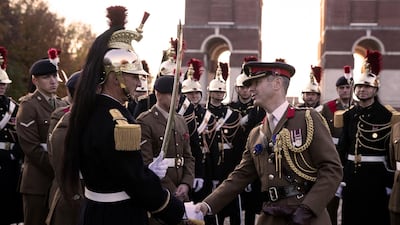Sitting prominently in a cabinet in my home is a military medal from the First World War awarded to my great-uncle, Captain Ernest Hellyer, who took part in that conflict. Much of his service was humdrum, well away from any danger, and, as a child, I learned little from him of what he had actually experienced. He served and survived.
I shall think of Uncle Ernest on Sunday as, in the company of ambassadors and military personnel from a wide range of countries, I attend a service at St Andrew's Church in Abu Dhabi that marks the 100th anniversary of the end of the First World War and remembers the millions involved in that conflict. It is one of many events taking place here in the Emirates, and across the world, that coincide with the 11th hour of the 11th day of the 11th month of 1918, when the guns fell silent on the Western Front in Europe.
The end of that conflict may have been a century ago, but its results and its aftermath remain with us, not simply in Europe, but far beyond. As a recent article in this paper noted, the present-day political geography of the Arab world emerged as a result of the defeat and collapse of the Ottoman Empire. More than a million troops from what was then British India fought in the war, from the muddy trenches of northern France to the deserts of Mesopotamia and the savannahs of Tanzania. Arab soldiers from the peninsula swept north into Palestine and Syria, as the concept of Arab nationalism gained strength, while thousands of others from the Levant served as officers in the Ottoman armies. It was a conflict that resonated far beyond the battlefields of Europe, which have, up until now, received the overwhelming majority of attention from historians.
One important feature of this anniversary is the way in which that broader aspect of the conflict is beginning to be recognised. Not for the first time, however, I find that much needs to be done to ensure that the basic facts of a major event in recent history, as this conflict was, are more widely known.
A few days ago, I was talking to students at a university in Dubai about the history of the UAE. Trying to relate our history to that of a wider world, I asked if any of them knew the significance of the date of November 11, 1918. None did. Yet some of these students, mainly young people of Indian heritage, may well have had grandparents or great-grandparents who served in, or were directly affected by, the First World War.
In Britain, there is now a concerted effort to throw some light, at last, on the contribution of colonial troops, including those from India, in the conflict. It is also time for greater recognition elsewhere of their service and of the sacrifice that was made. This is certainly applicable to the UAE’s expatriate communities today, so many of which derive from countries enmeshed in the world-changing events that took place between 1914 and 1918.
Here in the Emirates, the direct impact of the First World War was slight. The ships that carried thousands of Indian troops to the Iraqi battlefront appear to have bypassed the UAE’s ports, although news must have percolated down the Gulf of the surrender of the British-Indian Army at Kut Al Amara in 1916, an event described by one historian as “the most abject capitulation in Britain’s military history”. Naval conflict between the contesting powers did not impinge on the UAE’s waters, as it did in the Second World War, and there are few records of shortages of supplies, such as those that occurred in the 1940s.
We know now, only too well, that the many punishing military campaigns of 1914-18 did not form what was then optimistically proclaimed “the war to end all wars".
That’s why the tradition of commemorating the end of the First World War on November 11 each year has expanded its scope to include those who served and have died in subsequent conflicts. Some of those were long-lived catastrophes in terms of human suffering, others short and sharp hostilities that, nevertheless, wreaked their own devastation. In the Emirates later this month, on Martyrs’ Day, which falls on November 30, we will have our own losses of life in the ongoing conflict in Yemen to recall.
One feature of Sunday's service of remembrance, here and elsewhere, is the reading of a verse from Laurence Binyon's For the Fallen. It is of the best-known poems of the First World War, and one that, I readily confess, I always recite with a catch in my voice.
They shall grow not old, as we that are left grow old:
Age shall not weary them, nor the years condemn.
At the going down of the sun and in the morning
We will remember them.
One hundred years on, for those who laid down their lives in that conflict, and in those that have followed, it is right that we should do so.


